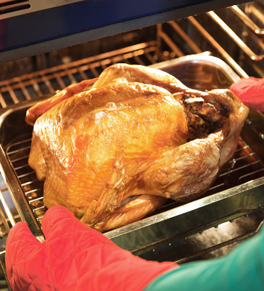How to prevent fires, burns on Thanksgiving

Fires and burns can happen anytime, but the risk is greatest around the holidays as the kitchen becomes a bustling hive of activity.
In fact, according to the U.S. Fire Administration, the average number of residential building fires on Thanksgiving Day is more than double the average of such fires all other days of the year.
“Cooking, by far, is the most common cause of those fires, accounting for about three-quarters of them,” says Dr. Syed F. Saquib, medical director of the UCI Health Regional Burn Center.
Cooking-related fires account for about 36% of home burn injuries.
“We see all sorts of flame- and grease-related injuries.”
Kitchen mishaps
Crowded holiday kitchens can be a recipe for burns and fires if one isn’t careful.
There a few simple adjustments that can keep everyone safe, Saquib says:
- Never leave a hot stove or oven unattended.
- Supervise small children and pets so they don’t become a tripping hazard or get injured. themselves. Create a child-free zone of a few feet around dangerous areas.
- Avoid loose-fitting clothing that can catch fire when near a flame.
- Handle hot pans and containers with pot holders and oven gloves.
- Keep food packaging and other flammable items away from the cooking area.
- Keep a lid or baking sheet handy to cover and extinguish any small grease fires that may occur.
Year-round, make sure you have smoke alarms throughout your home: on each floor, in and just outside every bedroom, Saquib recommends.
Deep fryer dangers
Deep-frying turkey has become popular, but this cooking method can be extremely dangerous. Every year, fryers cause an average of five deaths, 60 injuries and more than $15 million in property damage, according to the National Fire Protection Association.
To prevent becoming a statistic, Saquib recommends:
- Thaw the turkey completely before placing it in the fryer to prevent an explosion of hot oil.
- Premeasure the oil so it won’t overflow when the turkey is placed inside the fryer.
- Place the fryer at least 10 feet from the home and roof eaves.
- Ensure that the fryer is on a flat, sturdy surface to avoid spilling hot oil.
Treating a burn
"Burns require medical attention, with severe burns requiring immediate care," Saquib says.
He cautions against bathing a burn in ice-cold water.
“While that might help with pain, it can cause the burn to penetrate deeper into the skin and tissue.”
Instead, use cool or lukewarm water. Avoid applying home remedies like toothpaste, eggs, butter or mayonnaise on a burn, which Saquib says will hurt more than help by causing the wound to retain heat.
Instead, he recommends stocking your home first-aid kit with these burn care essentials:
- Gauze
- Petroleum jelly
- Antibacterial ointment
- Elastic wrap
But if the burn blisters, peels, has a pale, leathery texture or the pain is uncontrollable, Saquib says, “You should seek immediate attention at an emergency department.”
Related stories
- Home wound care do’s and don’ts ›
- Home burn care do’s and don’ts ›
- What's in your home first-aid kit? ›
- 9 festive recipes for healthy holiday meals ›




